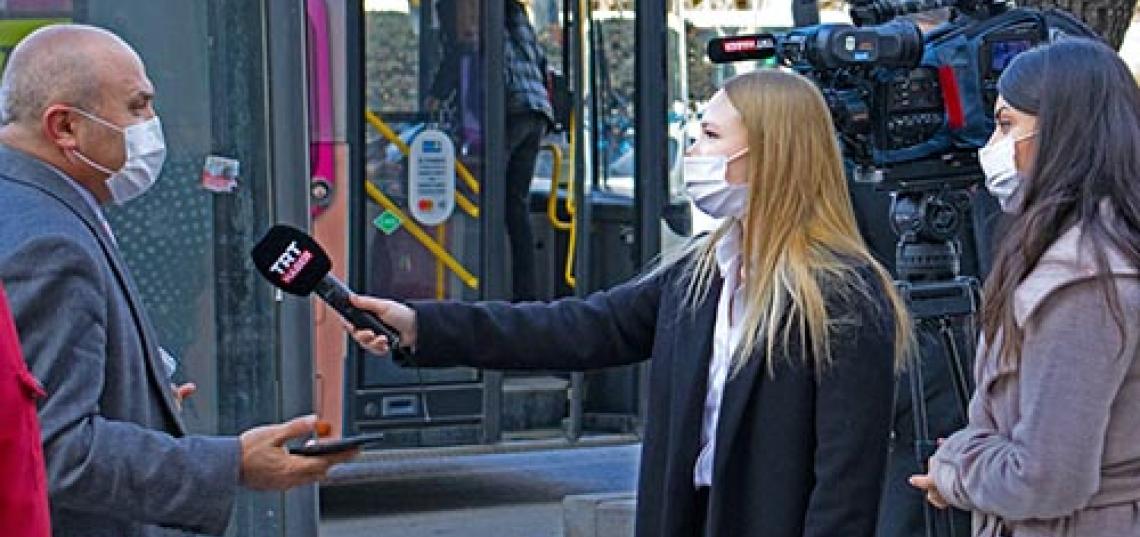
Campus media organizations, including newspapers and radio and television stations, play a significant role at American colleges and universities and beyond, and their influence has expanded in recent years as national and local media outlets have continued to shrink, SC&I Professor of Professional Practice Steven Miller told SC&I.
Miller, who is the Director of Undergraduate Studies in Journalism and Media Studies at Rutgers University-New Brunswick, spoke with SC&I about the powerful influence campus media can wield, which was recently demonstrated by The Stanford Daily, the campus newspaper at Stanford University.
A Stanford Daily news story published on November 29, 2022, “Stanford president’s research under investigation for scientific misconduct, University admits ‘mistakes’,” written by Stanford student Theo Baker, led to university investigations into the conduct of the then-Stanford University President Marc Tessier-Lavigne. The university’s investigations into Tessier-Lavigne, and their findings, led to his resignation, as was reported by The Stanford Daily on July 19, 2023: “Stanford president resigns over manipulated research, will retract at least three papers,” also written by Theo Baker.
The students’ reporting on Tessier-Lavigne was picked up widely by mainstream American and international media. In addition, the media also covered an interesting side story: the critical role Stanford’s student newspaper played in the investigation and resignation of the university’s president.
Miller spoke with SC&I about the growing influence of campus media outlets, as both independent news organizations and centers of training for journalists and other professionals.
SC&I: How would you characterize the role of campus media at Rutgers University?
SM: Student newspapers play a significant role, and have done so historically on all college campuses, especially at Rutgers. Rutgers’ The Daily Targum is the second oldest continuously running student newspaper in the country. Campus media not only play a role in student’s lives, but also gives them a legitimate means of expressing themselves. The training students receive at these outlets can play a significant role in preparing them for their lives during and after college.
A competently run campus media outlet dissuades administrators from trying to take away this valuable student-run resource.
SC&I: How do campus media organizations benefit by operating separately from their universities?
SM: The simple answer, of course, is that it trains students to run an organization that disseminates information and they must learn how to do that properly. They also have to learn about so many different areas while doing this, including First Amendment Law, Economics, History, and any other topic they cover.
They also have to demonstrate why they should be allowed to hold this powerful position. Over the years, some universities have discussed the idea that perhaps their campus newspapers should be run in the same way as high school newspapers are, where the Board of Education is the publisher. This is not only an issue about power, but it is also one of Free Speech. A competently run campus media outlet dissuades administrators from trying to take away this valuable student-run resource.
College media itself has played a role throughout history in determining what news organizations should and should not cover. One case I discuss in my JMS classes concerns a debate Northwestern University’s campus newspaper had with a student concerning privacy – whether the paper had the right to publish a photo of the student, taken at a public event, without the student’s permission. The debate spilled into the mainstream media and reignited discussions about free speech in America.
Every student should learn to research, write, and speak well, and campus media enables students to learn these skills.
SC&I: Should campus media organizations cover local news in addition to reporting on news at their universities?
SM: The Daily Targum and WRSU-FM should not just cover Rutgers. Campus Media are part of the New Brunswick and Piscataway communities, and should report on issues relating to these communities. In recent years so many local news deserts have evolved across the U.S. that some campus newspapers have stepped up and taken the place of the now defunct or diminished local news outlets. For example, the University of Michigan paper now covers Ann Arbor.
In central New Jersey we used to have three flourishing newspapers: the Home News, the Courier Press, and the Asbury Park Press covering state news from the New Jersey shore to Somerset County. Today, they don’t have the same influence as they had in the past, nor do their corporate owners dedicate enough resources to properly cover the community. This, in turn, minimizes citizens’ knowledge about what their local governments are doing and serves to help undermine trust in elected officials. We need competent, dependable local news outlets more than ever and, as evidenced by Stanford, Northwestern, and the University of Michigan, campus media are successfully filling that void.
SC&I: What are some of the skills students can acquire by working for their campus newspapers, and radio and TV stations?
SM: Skills gained working at the Targum and WRSU-FM at Rutgers, for example, can be applied to any career, not just journalism. Every student should learn to research, write, and speak well, and campus media enables students to learn these skills.
It’s been shown over the years that students who pursue careers as diverse as law, medicine, and economics benefit from training in journalism by taking those skills and applying them widely and effectively, to the betterment of their careers and society.
Learn more about the Journalism and Media Studies Department and major at the Rutgers School of Communication and Information on the website.
Image credit: Pexels
